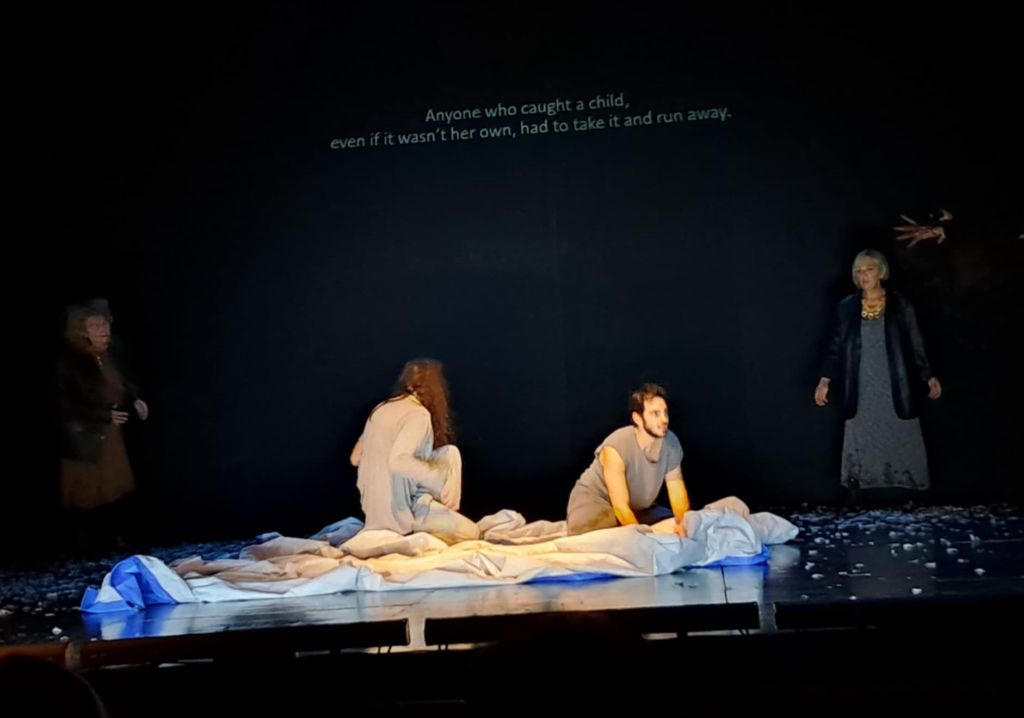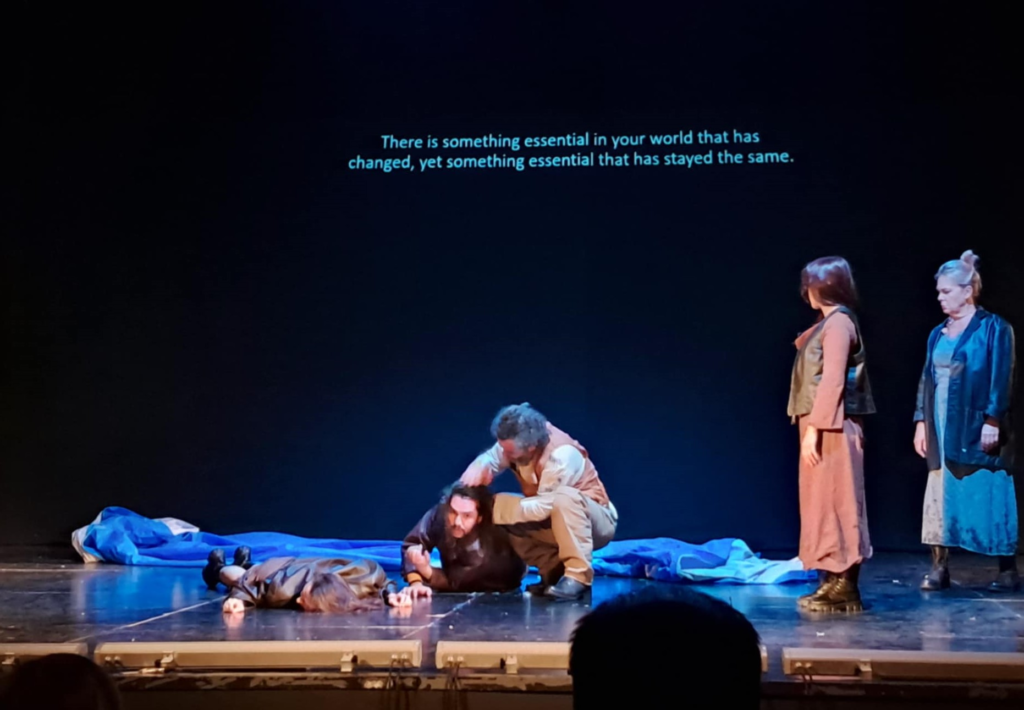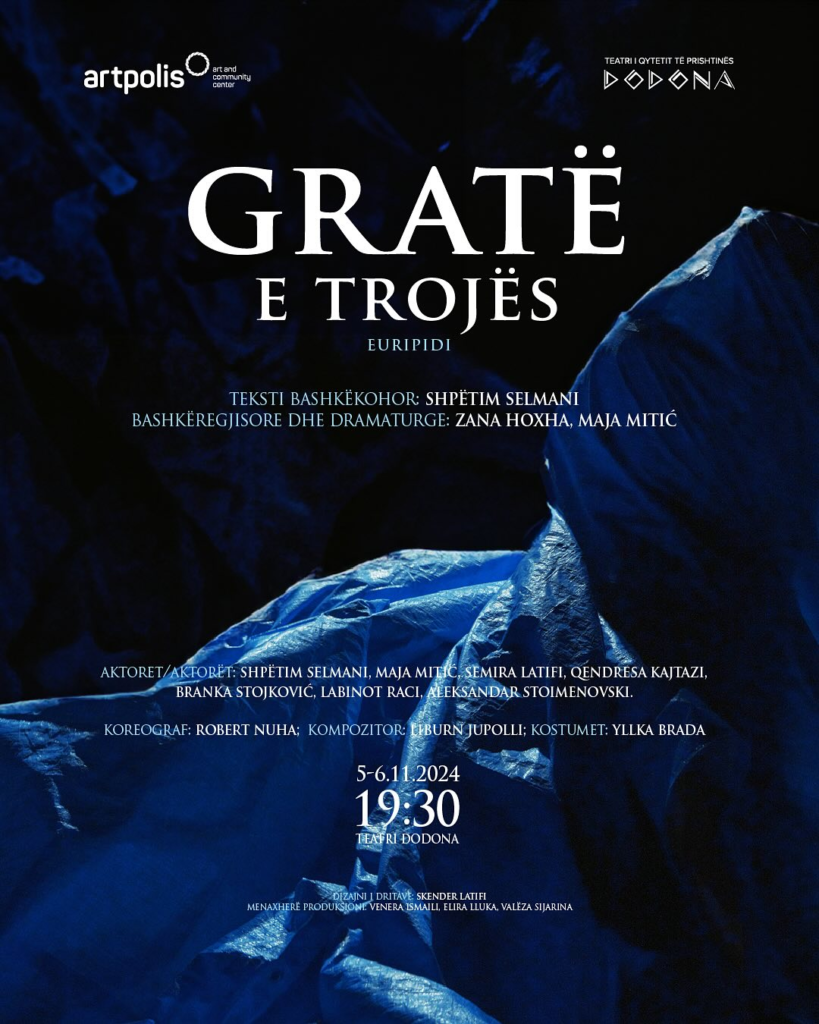Media: Kallxo.com
Story Title: Shfaqja ‘Gratë e Trojës’, thirrjet shqip e serbisht që shkundën skenën e “Dodonës” në kërkim të paqes
Date: November 7, 2024
Link: https://kallxo.com/kulture/shfaqja-grate-e-trojes-thirrjet-shqip-e-serbisht-qe-shkunden-skenen-e-dodones-ne-kerkim-te-paqes/
By: Isa Vatovci
The most tragic story of the conquest and destruction of ancient Troy is reflected in the captivity of the Trojan women by the Greeks; Queen Hecuba, Cassandra, Polyxena and Andromache. Immortalized with the tragedy “The Women of Troy”, written by Euripides, after the end of Troy they are separated from the kings of the Greek princes as spoils of war-captives. This painful story has served the Center for Arts and Communities, “Artpolis” and a group of artists from Belgrade (Serbia) to create theater performance “Women of Troy”, showing that pain and the Trojan reality continues to live even in our time.
With dramaturgy and direction by Zana Hoxha and Maja Mitić, and with a contemporary text by Shpëtim Selmani, “Women of Troy” was shown on Tuesday 05.11.2024, at the “Dodona” Theater in Prishtina. Staged by Albanian and Serbian actors, “Women of Troy” revealed the suffering of women after the war, highlighting the violence and brutality towards them. The special feature of the show is that the Albanian actors speak Albanian, while the Serbian ones speak Serbian, throughout the show, subtitled in English. The show brings, through a feminist approach, the sensitivity and resistance of women in the face of the terror of war, from ancient Greece to the present day, where wars are the havoc The Trojan women travel back in time, re-enacting the tragedy of women who experienced the last war in Kosovo, the war in Gaza, Ukraine, and more.
The play calls for peace and an end to conflicts in the world, a call that received applause from the audience.

“Troy, a metaphor for today’s crimes”
The Serbian actress, Maja Mitiq, told KALLXO.com that “Women of Troy” talks about the war, which is currently happening in Gaza or Somalia, or the war during the 90s in the Balkans, in the former Yugoslavia. She says that art must win in the face of war. “I feel that art must always win, not war and not murder, rape, who knows how many artists these days from Gaza or Ukraine who are immigrants. We think about these people, they are from the war, they are immigrants, and that’s why I ask the screenwriter, why didn’t you include some gods from Greek mythology that could protect them a little bit, maybe we could stop these wars that are happening” – says Mitiq, who is also the co-director of the show, “Women of Troy”.
Mitiq says that “Women of Troy” will be presented on November 22 and 23 (2024) at the Center for Cultural Decontamination in Belgrade. According to her, it is difficult to bring war narratives through art. But, as he says, they are important topics for changing society. “I usually choose topics that are important for changing society, because I believe that I can make a difference,” Mitiq said.
Actor Shpëtim Selmani, who has dramatized the modern text of the play, told KALLXO.com that the purpose of the play is to show that Troy still exists today. “The idea of the play is to show that the suffering of women still exists, that today Troy still exists, in the various places where there are wars, stories that are similar to ancient Greek tragedies, we rely on the work of Euripides, ‘Women of Troy’, we have an interweaving with current conflicts and we connected the situations” – he said.

The challenge of bilingualism
Director Zana Hoxha told KALLXO.com that the show “Women of Troy” is the result of a long process of work. “It has not been easy, almost a year and a half, it is one of the most difficult processes I have done in my life,” she said. Hoxha added that even though the show is based on one of the Greek tragedies, it speaks about today’s reality.
“I didn’t want to run away from what’s happening, I couldn’t make ‘Women of Troy’ without updating it, without giving a part of Kosovo, Gaza, and what’s happening in the world today” – said Hoxha.
But, a challenge for her, it was the realism of a play where the Albanian actors speak Albanian, while the Serbian actors speak Serbian, throughout the play. But, thanks to her, this is a historic step. “Obviously, it has been challenging to work in two languages because none of the actors know the Serbian language, nor the Serbian actors the Albanian language. Only I know both languages and sometimes I gave the indications in all three languages, Albanian, English, Serbian” – she said.
The show “Women of Troy”, according to director Hoxha, will be shown in Belgrade, Serbia, on November 22 and 23 (2024). Meanwhile, director Hoxha has already received an invitation to participate in Italy for the next year (2025).


